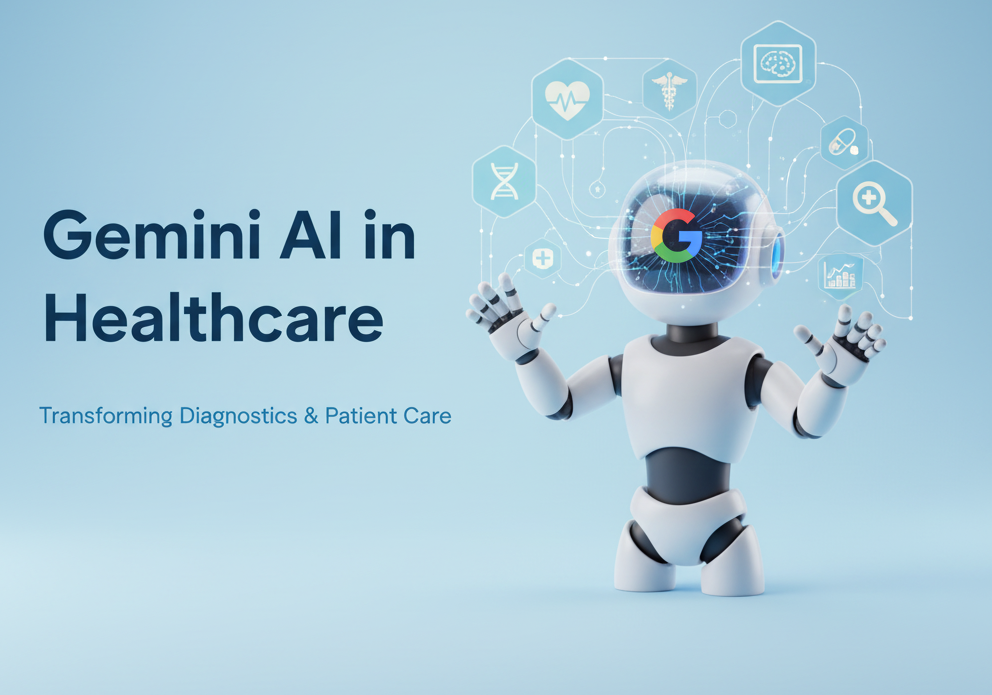
Beyond the Hype: How Gemini's AI API is Ushering in a New Era of HealthcareI
You’ve heard the buzzwords: Artificial Intelligence, Large Language Models, Generative AI. They promise to revolutionize every industry, but in healthcare—a field where lives are on the line and regulations are stringent—the conversation moves from “what’s possible” to “what’s practical and safe.”
Enter Google’s Gemini, a powerful family of multimodal AI models. Unlike standard LLMs that only process text, Gemini can natively understand and reason across text, images, audio, and video. This isn’t just a minor upgrade; it’s a fundamental shift that aligns perfectly with the multifaceted nature of medicine.
So, how do we move from theoretical potential to real-world impact? The answer lies in the Gemini API, the developer tool that allows innovators to build this powerful AI directly into the fabric of healthcare. Let’s explore the transformative use cases that are moving from the lab to the clinic.
1. The Invisible Scribe: Revolutionizing Clinical Documentation
The Problem: Physicians spend up to two hours on administrative work for every hour of patient care. This “pajama time”— burning the midnight oil on EHR documentation—leads to burnout and reduces face-to-face interaction.
The Gemini Solution: Imagine an ambient AI that sits in on the patient visit (with consent), listening to the natural conversation. The Gemini API can:
- Process Audio: Convert the doctor-patient dialogue to text.
- Understand Context: Identify key clinical concepts like symptoms, medications, diagnoses, and treatment plans.
- Generate a Structured Note: Automatically populate the EHR with a well-organized clinical note, including the History of Present Illness (HPI), Assessment, and Plan.
The Impact: Doctors get their evenings back, burnout decreases, and the patient-physician relationship is restored to its central role.
2. The Augmented Diagnostician: Enhancing Medical Imaging
The Problem: Radiologists and pathologists are inundated with vast volumes of complex images. The human eye, while expert, can suffer from fatigue, potentially missing subtle findings.
The Gemini Solution: Gemini’s native multimodal capability is a game-changer here. It can be integrated into PACS (Picture Archiving and Communication Systems) to:
- Analyze Images: Examine X-rays, MRIs, CT scans, and digitized pathology slides for anomalies like tumors, fractures, or hemorrhages.
- Correlate Data: Go beyond the image. Gemini can cross-reference the visual findings with the patient’s clinical history from their medical records. For example, it could flag a lung nodule on a CT scan and note the patient’s 20-year smoking history for the radiologist’s review.
- Prioritize Critical Cases: Instantly flag scans with potential signs of stroke or other time-sensitive conditions, ensuring they rise to the top of the reading list.
The Impact: Faster, more accurate diagnoses, reduced diagnostic errors, and empowered specialists working in tandem with AI.
3. The Research Accelerator: Supercharging Drug Discovery and Public Health
The Problem: Bringing a new drug to market takes over a decade and costs billions. A significant portion of that time is spent sifting through immense volumes of scientific data.
The Gemini Solution: The API can act as a super-powered research assistant for pharmaceutical companies and public health agencies.
- Accelerated Literature Review: Gemini can analyze thousands of scientific papers, clinical trial reports, and genomic datasets in hours, not years, to identify promising drug targets or understand disease mechanisms.
- Biomarker Identification: By processing multimodal data (genomic, proteomic, clinical), it can help identify novel biomarkers for early disease detection.
- Clinical Trial Matching: It can automatically match eligible patients to trials by analyzing their EHR data against complex inclusion/exclusion criteria, speeding up recruitment dramatically.
The Impact: Faster development of life-saving treatments, reduced costs, and more personalized medicine.
4. The Empathetic Educator: Transforming Patient Engagement
The Problem: Patients are often left confused by complex medical jargon, leading to poor health literacy and medication non-adherence.
The Gemini Solution: Powering the next generation of patient-facing tools, Gemini can:
- Demystify Medical Information: A patient can take a picture of their discharge summary, and a Gemini-powered app can instantly generate a simple, easy-to-understand explanation in their native language.
- Power Intelligent Health Assistants: Move beyond simple chatbots. A Gemini-driven assistant can answer complex questions like, “How should I take this new medication with my existing heart condition?” by drawing from trusted, up-to-date sources.
- Provide Personalized Guidance: Offer tailored pre- and post-operative care instructions or lifestyle recommendations based on a patient’s specific condition.
The Impact: Empowered, informed patients who are more engaged in their own care, leading to better health outcomes.
Navigating the Critical Path: Responsibility and Regulation
The potential is breathtaking, but responsible implementation is non-negotiable in healthcare.
- HIPAA Compliance & Data Security: Any application handling Protected Health Information (PHI) must be built on secure, compliant infrastructure, like Google Cloud with a signed Business Associate Agreement (BAA).
- The Human-in-the-Loop: Gemini is an assistive tool, not a replacement for clinical judgment. Its outputs must be verified by qualified healthcare professionals. The goal is augmented intelligence, not artificial replacement.
- Bias and Fairness: Models must be trained on diverse, representative datasets to ensure they work equitably for all patient populations.
- Regulatory Approval: Applications used for diagnostic purposes will require approval from bodies like the FDA, ensuring they are safe and effective.
The Future is Augmented
The journey of integrating Gemini APIs into healthcare is just beginning. We are moving toward a future where AI handles the administrative burden and data overload, freeing up clinicians to do what they do best: provide empathetic, complex, and human-centric care.
The promise of Gemini in healthcare isn’t just about smarter technology—it’s about building a healthier, more efficient, and more human world.
Is your organization exploring the potential of AI? The key is to start with a specific, high-impact problem and a partner who understands both the technology and the rigorous demands of the healthcare landscape. The future of medicine is collaborative, and AI is poised to be our most powerful partner yet.

